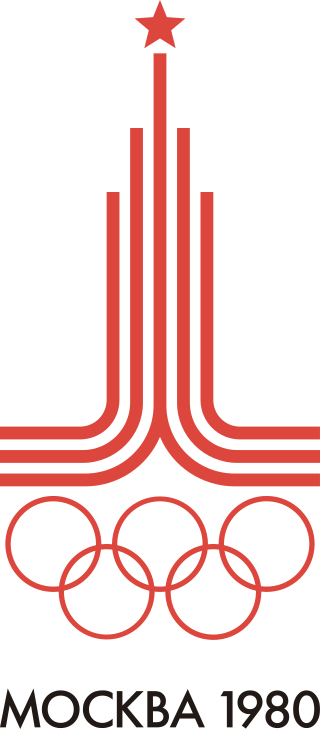
The 1980 Summer Olympics, officially known as the Games of the XXII Olympiad and commonly known as Moscow 1980, were an international multi-sport event held from 19 July to 3 August 1980 in Moscow, Soviet Union, in present-day Russia. The games were the first to be staged in an Eastern Bloc country, as well as the first Olympic Games and only Summer Olympics to be held in a Slavic language-speaking country. They were also the only Summer Olympic Games to be held in a socialist state until the 2008 Summer Olympics held in China. These were the final Olympic Games under the IOC Presidency of Michael Morris, 3rd Baron Killanin, before he was succeeded by Juan Antonio Samaranch.
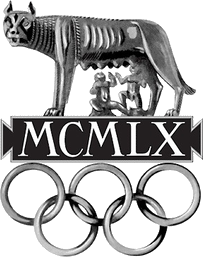
The 1960 Summer Olympics, officially known as the Games of the XVII Olympiad and commonly known as Rome 1960, were an international multi-sport event held from 25 August to 11 September 1960 in Rome, Italy. Rome had previously been awarded the administration of the 1908 Summer Olympics, but following the eruption of Mount Vesuvius in 1906, the city had no choice but to decline and pass the honour to London. The Soviet Union won the most gold and overall medals at the 1960 Games.
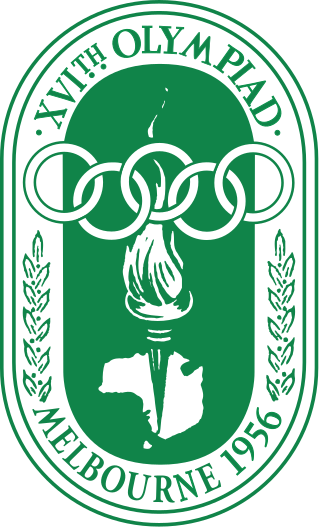
The 1956 Summer Olympics, officially known as the Games of the XVI Olympiad, were an international multi-sport event held in Melbourne, Victoria, Australia, from 22 November to 8 December 1956, with the exception of the equestrian events, which were held in Stockholm, Sweden, in June 1956.

Robert Dennis Blanchflower was a former Northern Ireland footballer, football manager and journalist who played for and captained Tottenham Hotspur, including during their double-winning season of 1960–61. He was ranked as the greatest player in Spurs history by The Times in 2009.
George Derek Ibbotson was an English runner who excelled in athletics in the 1950s. His most famous achievement was setting a new world record in the mile in 1957.
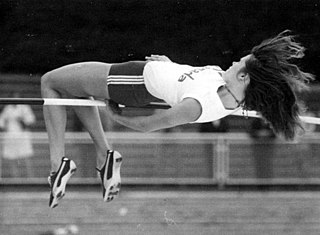
Debbie Arden Brill, is a Canadian high jump athlete who at the age of 16 became the first North American woman to clear 6 feet. Her reverse jumping style—which is now almost exclusively the technique of elite high jumpers—was called the Brill Bend and was developed by her when she was a child, around the same time as Dick Fosbury was developing the similar Fosbury Flop in the US. Brill won gold in the high jump at the 1970 Commonwealth Games, and at the Pan American Games in 1971. She finished 8th in the 1972 Summer Olympics, then quit the sport in the wake of the Munich massacre, returning three years later. She won gold at the IAAF World Cup in 1979 and at the 1982 Commonwealth Games. She has held the Canadian high jump record since 1969, and set the current record of 1.99 meters in 1982, a few months after giving birth to her first child.

Elżbieta Maria Krzesińska was a track and field athlete from Poland, who competed in the long jump. Born in Warsaw, she competed for her native country at the 1956 Summer Olympics held in Melbourne, Australia where she won the gold medal in the Women's Long Jump. She returned to the 1960 Summer Olympics in Rome but failed to defend her title, finishing second behind Soviet Vera Krepkina.
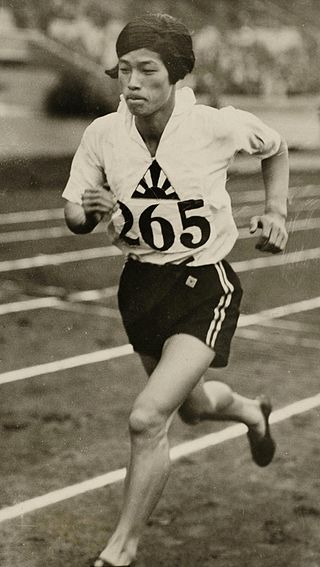
Kinue Hitomi was a Japanese track and field athlete. She was the world record holder in several events in the 1920s – 1930s and was the first Japanese woman to win an Olympic medal. She was also the first woman to represent Japan at the Olympics.
Olga Gyarmati was a Hungarian all-round track and field athlete who competed at three Olympic Games in four different events. Her greatest success was winning the inaugural Olympic Women's Long Jump competition in London in 1948. Additionally, she won two Universiade gold medals and a number of Hungarian Athletics Championships titles in sprint and jumping events.
Sheila W. Lerwill is a British athlete who competed mainly in the high jump.
Tania Murray Haigh is a former New Zealand high jumper and triple jumper. She won the gold medal in the women's high jump representing her country at the 1990 Commonwealth Games, and won eight national athletic championship titles.
Geoffrey Michael Elliott was a pole vaulter, shot putter and decathlete from England. He was born in Ilford.

Avis Fletcher is a former New Zealand hurdler and sprinter.
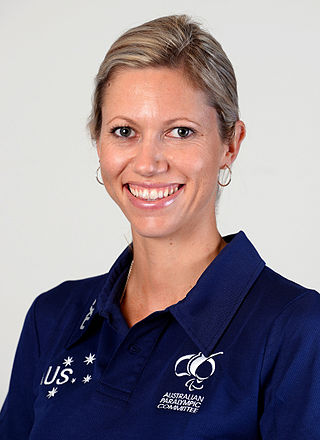
Carlee Beattie is an Australian Paralympic athletics competitor. A congenital arm amputee, she won the silver medal at the 2012 Summer Paralympics and a gold medal at the 2015 IPC Athletics World Championships in the Women's Long Jump. She represented Australia at the 2016 Rio Paralympics.
Janet Margaret Boyle is a former high jumper from Northern Ireland. She represented Great Britain & Northern Ireland at the 1988 Olympic Games in Seoul. At the Commonwealth Games, she won a bronze medal in Edinburgh 1986 and a silver medal in Auckland 1990.

Mary D'Souza Sequeira is an Indian female Olympian who competed internationally in track and field and field hockey. She competed in the women's 100 and 200 metres at the 1952 Summer Olympics. D'Souza won a bronze medal in the 200 metres and a silver medal in the 4 × 100 m relay at the 1951 Asian Games with Pat Mendonca, Banoo Gulzar and Roshan Mistry.

Beverly Dawn Edith Weigel, with her first name commonly misspelled as Beverley and since her marriage known as Beverly Robertson, is a New Zealand athlete. Mainly active as a long jumper, but also as a sprinter, she represented her country at the 1956 Summer Olympics, the 1958 British Empire and Commonwealth Games, and the 1960 Summer Olympics.
Kenneth Leonard Norris is a British long-distance runner. He competed in the men's 10,000 metres at the 1956 Summer Olympics. He was one of many signatories in a letter to The Times on 17 July 1958 opposing 'the policy of apartheid' in international sport and defending 'the principle of racial equality which is embodied in the Declaration of the Olympic Games'.
Louise Alexandra"Alix"Stevenson is a Scottish retired athlete. She competed for Great Britain in the women's long jump at the 1964 Summer Olympics in Tokyo, Japan.
Eilish Flanagan is an Irish long distance runner. She competed in the 3000 metres steeplechase at the 2020 Olympics.










